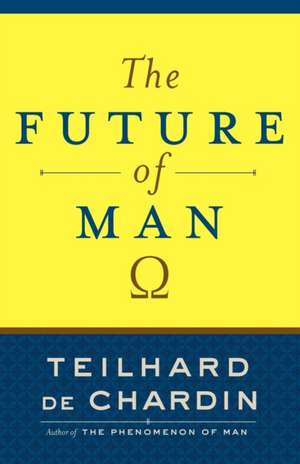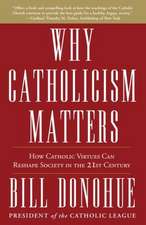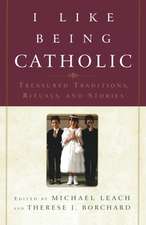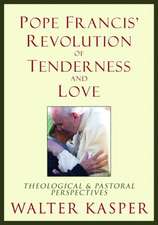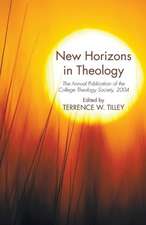The Future of Man
Autor Teilhard De Chardin, Pierre Teilhard De Chardinen Limba Engleză Paperback – 31 mar 2004
Preț: 130.90 lei
Nou
Puncte Express: 196
Preț estimativ în valută:
25.05€ • 26.12$ • 20.82£
25.05€ • 26.12$ • 20.82£
Carte disponibilă
Livrare economică 27 februarie-13 martie
Preluare comenzi: 021 569.72.76
Specificații
ISBN-13: 9780385510721
ISBN-10: 0385510721
Pagini: 336
Dimensiuni: 137 x 216 x 23 mm
Greutate: 0.43 kg
Editura: IMAGE
ISBN-10: 0385510721
Pagini: 336
Dimensiuni: 137 x 216 x 23 mm
Greutate: 0.43 kg
Editura: IMAGE
Notă biografică
TEILHARD de CHARDIN (1881-1955) was a philosopher, paleontologist, and Jesuit priest. Born in France, educated in Jesuit schools, and ordained in 1911, he journeyed to various parts of the world on geological and paleontological expeditions and published several works on science. His renowned works, The Phenomenon of Man and The Divine Milieu, were published shortly after his death and today are regarded as classics of Catholic theology.
Extras
Chapter 1
A Note on Progress
e pur si muove
The conflict dates from the day when one man, flying in the face of appearance, perceived that the forces of nature are no more unalterably fixed in their orbits than the stars themselves, but that their serene arrangement around us depicts the flow of a tremendous tide--the day on which a first voice rang out, crying to Mankind peacefully slumbering on the raft of Earth, "We are moving! We are going forward!" . . .
It is a pleasant and dramatic spectacle, that of Mankind divided to its very depths into two irrevocably opposed camps--one looking toward the horizon and proclaiming with all its new-found faith, "We are moving," and the other, without shifting its position, obstinately maintaining, "Nothing changes. We are not moving at all."
These latter, the "immobilists," though they lack passion (immobility has never inspired anyone with enthusiasm!)1, have commonsense on their side, habit of thought, inertia, pessimism and also, to some extent, morality and religion. Nothing, they argue, appears to have changed since man began to hand down the memory of the past, not the undulations of the earth, or the forms of life, or the genius of Man or even his goodness. Thus far practical experimentation has failed to modify the fundamental characteristics of even the most humble plant. Human suffering, vice and war, although they may momentarily abate, recur from age to age with an increasing virulence. Even the striving after progress contributes to the sum of evil: to effect change is to undermine the painfully established traditional order whereby the distress of living creatures was reduced to a minimum. What innovator has not retapped the springs of blood and tears? For the sake of human tranquillity, in the name of Fact, and in defense of the sacred Established Order, the immobilists forbid the earth to move. Nothing changes, they say, or can change. The raft must drift purposelessly on a shoreless sea.
But the other half of mankind, startled by the lookout's cry, has left the huddle where the rest of the crew sit with their heads together telling time-honored tales. Gazing out over the dark sea they study for themselves the lapping of waters along the hull of the craft that bears them, breathe the scents borne to them on the breeze, gaze at the shadows cast from pole to pole by a changeless eternity. And for these all things, while remaining separately the same--the ripple of water, the scent of the air, the lights in the sky--become linked together and acquire a new sense: the fixed and random Universe is seen to move.
No one in the world who has seen this vision can be restrained from guarding and proclaiming it. To testify to my faith in it, and to show reasons, is my purpose here.
It is clear in the first place that the world in its present state is the outcome of movement. Whether we consider the position of the rocky layers enveloping the Earth, the arrangement of the forms of life that inhabit it, the variety of civilizations to which it has given birth, or the structure of languages spoken upon it, we are forced to the same conclusion: that everything is the sum of the past and that nothing is comprehensible except through its history. "Nature" is the equivalent of "becoming," self-creation: this is the view to which experience irresistibly leads us. What can it mean except that the Universe must, at least at some stage, have been in movement; that it has been malleable, acquiring by degrees, not only in their accidental details but in their very essence, the perfections which now adorn it? There is nothing, not even the human soul, the highest spiritual manifestation we know of, that does not come within this universal law. The soul, too, has its clearly defined place in the slow ascent of living creatures toward consciousness, and must therefore in one way or another have grown out of the general mobility of things. Those who look reality in the face cannot fail to perceive this progressive genesis of the Universe, and with a clarity which leaves no room for doubt. Whatever the other side may say, clinging to their imaginary world, the Cosmos did once move, the whole of it, not only locally but in its very being. This is undeniable and we shall not discuss it further. But is it still moving? Here we have the real question, the living, burning question of Evolution.
It is the fundamental paradox of Nature as we see it now that its universal plasticity seems suddenly to have hardened. Like an ocean-wave caught in a snapshot, or a torrent of lava stiffened by cooling, the mountains and living things of the earth wear the aspect, to those who study them, of a powerful momentum that has become petrified. Nature seen at a distance appears to be malleable and in motion; but seek to lay hands on it, to deflect by force even the least of Life's directions, and you will encounter nothing but absolute rigidity, an unshakably stubborn refusal to depart from the preordained path.
But let us note that this present rigidity of Nature does not, as some people believe, in any way lessen the certainty of its past mobility. What we regard as the fixity of present organisms may be simply a state of very slow movement, or of rest between spells of movement. It is true that we have not yet succeeded in shaping life to our requirements in the laboratory; but who has shaped or witnessed the shaping of a geological stratum? The rock which we seek to compress crumbles because we work too fast or with oversmall fragments. Calcareous matter, if it is to be made malleable, needs to be embedded in a vast mass, and perhaps its reshaping is a process of immense slowness. If we have not seen the upward thrust of mountain ranges it is because their rise was accomplished either in widely spaced jerks or with so slow a rhythm that since the coming of Man nothing of the kind has happened, or at least nothing that has been perceptible to us. Why should not Life, too, be mobile only in great masses, or through the slow action of time, or in brief stages? Who can positively affirm that at this moment, although we perceive nothing, new forms are not taking shape in the contours of the earth and of Life? . . .
The plasticity of Nature in the past is an undeniable fact; its present rigidity is less capable of scientific proof. If we had to choose between transformism and fixism, that is to say between two absolutes--everything incestantly in motion, or everything for ever immovable--we should be bound to choose the first. But there is a third possible hypothesis, namely that everything was at one time fluid but is now irrevocably fixed. It is this third alternative that I wish to examine and dismiss.
The hypothesis of a definitive halt in terrestrial evolution is, to my mind, suggested less by the apparently unchanging nature of present forms than by a certain general aspect of the world coinciding with this appearance of cessation. It is most striking that the morphological change of living creatures seems to have slowed down at the precise moment when Thought appeared on earth. If we relate this coincidence to the fact that the only general line taken by biological evolution has been in the direction of the largest brain--broadly speaking, of the highest state of consciousness--we are compelled to wonder whether the true fundamental impulse underlying the growth of animal forces has not been the "need" to know and to think; and whether, when this overriding impulse eventually found its outlet in the human species, the effect was not to produce an abrupt diminution of "vital pressure" in the other branches of the Tree of Life. This would explain the fact that "evolving Life," from the end of the Tertiary era, has been confined to the little group of higher primates. We know of many forms that have disappeared since the Oligocene, but of no genuinely new species other than the anthropoids. This again may be explained by the extreme brevity of the Miocene as compared with other geological periods. But does it not lead us to surmise that the "phyla" possessing higher psychic attributes have absorbed all the forces at Life's disposal?
If we are to find a definitive answer to the question of the entitative progress of the Universe we must do so by adopting the least favourable position--that is to say, by envisaging a world whose evolutionary capacity is concentrated upon and confined to the human soul. The question of whether the Universe is still developing then becomes a matter of deciding whether the human spirit is still in process of evolution. To this I reply unhesitatingly, "Yes, it is." The nature of Man is in the full flood of entitative change. But to grasp this it is necessary (a) not to overlook the biological (morphogenic) value of moral action, and (b) to accept the organic nature of interindividual relationships. We shall then see that a vast evolutionary process is in ceaseless operation around us, but that it is situated within the sphere of consciousness (and collective consciousness).
What is the difference between ourselves, citizens of the twentieth century, and the earliest human beings whose soul is not entirely hidden from us? In what respects may we consider ourselves their superiors and more advanced than they?
Organically speaking, the faculties of those remote forebears were probably the equal of our own. By the middle of the last Ice Age, at the latest, some human groups had attained to the expression of aesthetic powers calling for intelligence and sensibility developed to a point which we have not surpassed. To all appearance the ultimate perfection of the human element was achieved many thousands of years ago, which is to say that the individual instrument of thought and action may be considered to have been finalized. But there is fortunately another dimension in which variation is still possible, and in which we continue to evolve.
The great superiority over Primitive Man which we have acquired and which will be enhanced by our descendants in a degree perhaps undreamed-of by ourselves, is in the realm of self-knowledge: in our growing capacity to situate ourselves in space and time, to the point of becoming conscious of our place and responsibility in relation to the Universe.
Surmounting in turn the illusions of terrestrial flatness, immobility and autocentricity, we have taken the unhopeful surface of the earth and "rolled it like a little ball"; we have set it on a course among the stars; we have grasped the fact that it is no more than a grain of cosmic dust; and we have discovered that a process without limit has brought into being the realms of substance and essence. Our fathers supposed themselves to go back no further than yesterday, each man containing within himself the ultimate value of his existence. They held themselves to be confined within the limits of their years on earth and their corporeal frame. We have blown asunder this narrow compass and those beliefs. At once humbled and ennobled by our discoveries, we are gradually coming to see ourselves as a part of vast and continuing processes; as though awakening from a dream, we are beginning to realize that our nobility consists in serving, like intelligent atoms, the work proceeding in the Universe. We have discovered that there is a Whole, of which we are the elements. We have found the world in our own souls.
What does this conquest signify? Does it merely denote the establishment, in worldly terms, of an idealized system of logical, extrinsic relationships? Is it no more than an intellectual luxury, as is commonly supposed--the mere satisfaction of curiosity? No. The consciousness which we are gradually acquiring of our physical relationship with all parts of the Universe represents a genuine enlarging of our separate personalities. It is truly a progressive realization of the universality of the things surrounding each of us. And it means that in the domain external to our flesh our real and whole body is continuing to take shape.
That is in no way a "sentimental" affirmation.
The proof that the growing coextension of our soul and the world, through the consciousness of our relationship with all things, is not simply a matter of logic or idealization, but is part of an organic process, the natural outcome of the impulse which caused the germination of life and the growth of the brain--the proof is that it expresses itself in a specific evolution of the moral value of our actions (that is to say, by the modification of what is most living within us).
No doubt it is true that the scope of individual human action, as commonly envisaged in the abstract theory of moral and meritorious acts, is not greatly enhanced by the growth of human knowledge. Inasmuch as the willpower of contemporary man is not in itself more vigorous or unswerving than that of a Plato or an Augustine, and individual moral perfection is still to be measured by steadfastness in pursuance of the known good (and therefore relative) we cannot claim as individuals to be more moral or saintly than our fathers.
Yet this must be said, to our own honor and that of those who have toiled to make us what we are: that between the behavior of men in the first century a.d. and our own, the difference is as great, or greater, than that between the behavior of a fifteen-year-old boy and a man of forty. Why is this so? Because, owing to the progress of science and of thought, our actions today, whether for good or ill, proceed from an incomparably higher point of departure than those of the men who paved the way for us toward enlightenment. When Plato acted it was probably in the belief that his freedom to act could only affect a small fragment of the world, narrowly circumscribed in space and time; but the man of today acts in the knowledge that the choice he makes will have its repercussions through countless centuries and upon countless human beings. He feels in himself the responsibilities and the power of an entire Universe. Progress has not caused the action of Man (Man himself) to change in each separate individual; but because of it the action of human nature (Mankind) has acquired, in every thinking man, a fullness that is wholly new. Moreover, how are we to compare or contrast our acts with those of Plato or Augustine? All such acts are linked, and Plato and Augustine are still expressing, through me, the whole extent of their personalities. There is a kind of human action that gradually matures through a multitude of human acts. The human monad has long been constituted. What is now proceeding is the animation (assimilation) of the Universe by that monad; that is to say, the realization of a consummated human Thought.
A Note on Progress
e pur si muove
The conflict dates from the day when one man, flying in the face of appearance, perceived that the forces of nature are no more unalterably fixed in their orbits than the stars themselves, but that their serene arrangement around us depicts the flow of a tremendous tide--the day on which a first voice rang out, crying to Mankind peacefully slumbering on the raft of Earth, "We are moving! We are going forward!" . . .
It is a pleasant and dramatic spectacle, that of Mankind divided to its very depths into two irrevocably opposed camps--one looking toward the horizon and proclaiming with all its new-found faith, "We are moving," and the other, without shifting its position, obstinately maintaining, "Nothing changes. We are not moving at all."
These latter, the "immobilists," though they lack passion (immobility has never inspired anyone with enthusiasm!)1, have commonsense on their side, habit of thought, inertia, pessimism and also, to some extent, morality and religion. Nothing, they argue, appears to have changed since man began to hand down the memory of the past, not the undulations of the earth, or the forms of life, or the genius of Man or even his goodness. Thus far practical experimentation has failed to modify the fundamental characteristics of even the most humble plant. Human suffering, vice and war, although they may momentarily abate, recur from age to age with an increasing virulence. Even the striving after progress contributes to the sum of evil: to effect change is to undermine the painfully established traditional order whereby the distress of living creatures was reduced to a minimum. What innovator has not retapped the springs of blood and tears? For the sake of human tranquillity, in the name of Fact, and in defense of the sacred Established Order, the immobilists forbid the earth to move. Nothing changes, they say, or can change. The raft must drift purposelessly on a shoreless sea.
But the other half of mankind, startled by the lookout's cry, has left the huddle where the rest of the crew sit with their heads together telling time-honored tales. Gazing out over the dark sea they study for themselves the lapping of waters along the hull of the craft that bears them, breathe the scents borne to them on the breeze, gaze at the shadows cast from pole to pole by a changeless eternity. And for these all things, while remaining separately the same--the ripple of water, the scent of the air, the lights in the sky--become linked together and acquire a new sense: the fixed and random Universe is seen to move.
No one in the world who has seen this vision can be restrained from guarding and proclaiming it. To testify to my faith in it, and to show reasons, is my purpose here.
It is clear in the first place that the world in its present state is the outcome of movement. Whether we consider the position of the rocky layers enveloping the Earth, the arrangement of the forms of life that inhabit it, the variety of civilizations to which it has given birth, or the structure of languages spoken upon it, we are forced to the same conclusion: that everything is the sum of the past and that nothing is comprehensible except through its history. "Nature" is the equivalent of "becoming," self-creation: this is the view to which experience irresistibly leads us. What can it mean except that the Universe must, at least at some stage, have been in movement; that it has been malleable, acquiring by degrees, not only in their accidental details but in their very essence, the perfections which now adorn it? There is nothing, not even the human soul, the highest spiritual manifestation we know of, that does not come within this universal law. The soul, too, has its clearly defined place in the slow ascent of living creatures toward consciousness, and must therefore in one way or another have grown out of the general mobility of things. Those who look reality in the face cannot fail to perceive this progressive genesis of the Universe, and with a clarity which leaves no room for doubt. Whatever the other side may say, clinging to their imaginary world, the Cosmos did once move, the whole of it, not only locally but in its very being. This is undeniable and we shall not discuss it further. But is it still moving? Here we have the real question, the living, burning question of Evolution.
It is the fundamental paradox of Nature as we see it now that its universal plasticity seems suddenly to have hardened. Like an ocean-wave caught in a snapshot, or a torrent of lava stiffened by cooling, the mountains and living things of the earth wear the aspect, to those who study them, of a powerful momentum that has become petrified. Nature seen at a distance appears to be malleable and in motion; but seek to lay hands on it, to deflect by force even the least of Life's directions, and you will encounter nothing but absolute rigidity, an unshakably stubborn refusal to depart from the preordained path.
But let us note that this present rigidity of Nature does not, as some people believe, in any way lessen the certainty of its past mobility. What we regard as the fixity of present organisms may be simply a state of very slow movement, or of rest between spells of movement. It is true that we have not yet succeeded in shaping life to our requirements in the laboratory; but who has shaped or witnessed the shaping of a geological stratum? The rock which we seek to compress crumbles because we work too fast or with oversmall fragments. Calcareous matter, if it is to be made malleable, needs to be embedded in a vast mass, and perhaps its reshaping is a process of immense slowness. If we have not seen the upward thrust of mountain ranges it is because their rise was accomplished either in widely spaced jerks or with so slow a rhythm that since the coming of Man nothing of the kind has happened, or at least nothing that has been perceptible to us. Why should not Life, too, be mobile only in great masses, or through the slow action of time, or in brief stages? Who can positively affirm that at this moment, although we perceive nothing, new forms are not taking shape in the contours of the earth and of Life? . . .
The plasticity of Nature in the past is an undeniable fact; its present rigidity is less capable of scientific proof. If we had to choose between transformism and fixism, that is to say between two absolutes--everything incestantly in motion, or everything for ever immovable--we should be bound to choose the first. But there is a third possible hypothesis, namely that everything was at one time fluid but is now irrevocably fixed. It is this third alternative that I wish to examine and dismiss.
The hypothesis of a definitive halt in terrestrial evolution is, to my mind, suggested less by the apparently unchanging nature of present forms than by a certain general aspect of the world coinciding with this appearance of cessation. It is most striking that the morphological change of living creatures seems to have slowed down at the precise moment when Thought appeared on earth. If we relate this coincidence to the fact that the only general line taken by biological evolution has been in the direction of the largest brain--broadly speaking, of the highest state of consciousness--we are compelled to wonder whether the true fundamental impulse underlying the growth of animal forces has not been the "need" to know and to think; and whether, when this overriding impulse eventually found its outlet in the human species, the effect was not to produce an abrupt diminution of "vital pressure" in the other branches of the Tree of Life. This would explain the fact that "evolving Life," from the end of the Tertiary era, has been confined to the little group of higher primates. We know of many forms that have disappeared since the Oligocene, but of no genuinely new species other than the anthropoids. This again may be explained by the extreme brevity of the Miocene as compared with other geological periods. But does it not lead us to surmise that the "phyla" possessing higher psychic attributes have absorbed all the forces at Life's disposal?
If we are to find a definitive answer to the question of the entitative progress of the Universe we must do so by adopting the least favourable position--that is to say, by envisaging a world whose evolutionary capacity is concentrated upon and confined to the human soul. The question of whether the Universe is still developing then becomes a matter of deciding whether the human spirit is still in process of evolution. To this I reply unhesitatingly, "Yes, it is." The nature of Man is in the full flood of entitative change. But to grasp this it is necessary (a) not to overlook the biological (morphogenic) value of moral action, and (b) to accept the organic nature of interindividual relationships. We shall then see that a vast evolutionary process is in ceaseless operation around us, but that it is situated within the sphere of consciousness (and collective consciousness).
What is the difference between ourselves, citizens of the twentieth century, and the earliest human beings whose soul is not entirely hidden from us? In what respects may we consider ourselves their superiors and more advanced than they?
Organically speaking, the faculties of those remote forebears were probably the equal of our own. By the middle of the last Ice Age, at the latest, some human groups had attained to the expression of aesthetic powers calling for intelligence and sensibility developed to a point which we have not surpassed. To all appearance the ultimate perfection of the human element was achieved many thousands of years ago, which is to say that the individual instrument of thought and action may be considered to have been finalized. But there is fortunately another dimension in which variation is still possible, and in which we continue to evolve.
The great superiority over Primitive Man which we have acquired and which will be enhanced by our descendants in a degree perhaps undreamed-of by ourselves, is in the realm of self-knowledge: in our growing capacity to situate ourselves in space and time, to the point of becoming conscious of our place and responsibility in relation to the Universe.
Surmounting in turn the illusions of terrestrial flatness, immobility and autocentricity, we have taken the unhopeful surface of the earth and "rolled it like a little ball"; we have set it on a course among the stars; we have grasped the fact that it is no more than a grain of cosmic dust; and we have discovered that a process without limit has brought into being the realms of substance and essence. Our fathers supposed themselves to go back no further than yesterday, each man containing within himself the ultimate value of his existence. They held themselves to be confined within the limits of their years on earth and their corporeal frame. We have blown asunder this narrow compass and those beliefs. At once humbled and ennobled by our discoveries, we are gradually coming to see ourselves as a part of vast and continuing processes; as though awakening from a dream, we are beginning to realize that our nobility consists in serving, like intelligent atoms, the work proceeding in the Universe. We have discovered that there is a Whole, of which we are the elements. We have found the world in our own souls.
What does this conquest signify? Does it merely denote the establishment, in worldly terms, of an idealized system of logical, extrinsic relationships? Is it no more than an intellectual luxury, as is commonly supposed--the mere satisfaction of curiosity? No. The consciousness which we are gradually acquiring of our physical relationship with all parts of the Universe represents a genuine enlarging of our separate personalities. It is truly a progressive realization of the universality of the things surrounding each of us. And it means that in the domain external to our flesh our real and whole body is continuing to take shape.
That is in no way a "sentimental" affirmation.
The proof that the growing coextension of our soul and the world, through the consciousness of our relationship with all things, is not simply a matter of logic or idealization, but is part of an organic process, the natural outcome of the impulse which caused the germination of life and the growth of the brain--the proof is that it expresses itself in a specific evolution of the moral value of our actions (that is to say, by the modification of what is most living within us).
No doubt it is true that the scope of individual human action, as commonly envisaged in the abstract theory of moral and meritorious acts, is not greatly enhanced by the growth of human knowledge. Inasmuch as the willpower of contemporary man is not in itself more vigorous or unswerving than that of a Plato or an Augustine, and individual moral perfection is still to be measured by steadfastness in pursuance of the known good (and therefore relative) we cannot claim as individuals to be more moral or saintly than our fathers.
Yet this must be said, to our own honor and that of those who have toiled to make us what we are: that between the behavior of men in the first century a.d. and our own, the difference is as great, or greater, than that between the behavior of a fifteen-year-old boy and a man of forty. Why is this so? Because, owing to the progress of science and of thought, our actions today, whether for good or ill, proceed from an incomparably higher point of departure than those of the men who paved the way for us toward enlightenment. When Plato acted it was probably in the belief that his freedom to act could only affect a small fragment of the world, narrowly circumscribed in space and time; but the man of today acts in the knowledge that the choice he makes will have its repercussions through countless centuries and upon countless human beings. He feels in himself the responsibilities and the power of an entire Universe. Progress has not caused the action of Man (Man himself) to change in each separate individual; but because of it the action of human nature (Mankind) has acquired, in every thinking man, a fullness that is wholly new. Moreover, how are we to compare or contrast our acts with those of Plato or Augustine? All such acts are linked, and Plato and Augustine are still expressing, through me, the whole extent of their personalities. There is a kind of human action that gradually matures through a multitude of human acts. The human monad has long been constituted. What is now proceeding is the animation (assimilation) of the Universe by that monad; that is to say, the realization of a consummated human Thought.
